#i found this somewhere
Explore tagged Tumblr posts
Text

7 notes
·
View notes
Text

#if anyone sees this#pls share#i found this somewhere#but i forgot#aaaghgh#i’m posting it here#cuz i want u all to have access to it
2 notes
·
View notes
Text
i cannot keep my identity secret anymore. I am harrier du bois



#The shoes came today#cant believe i found em on a second hand site for pretty cheap#them and the tie clash horribly#and thats a good thing#i wouldnt call this a cosplay because i look nothing like him#but it sure is something#i just hate the way wigs look on most occassions:( maybe i'll get fake mutton chops somewhere#Disco elysium#de#harrier du bois#hdb#harry du bois#cosplay#disco elysium cosplay#fashion#my posts
7K notes
·
View notes
Text
also in regards to that last article about varied ways of thinking about psychosis/altered states that don't just align with medical model or carceral psychiatry---I always love sharing about Bethel House and their practices of peer support for schizophrenia that are founded on something called tojisha kenkyu, but I don't see it mentioned as often as things like HVN and Soteria House.

ID: [A colorful digital drawing of a group of people having a meeting inside a house while it snows outside.]
"What really set the stage for tōjisha-kenkyū were two social movements started by those with disabilities. In the 1950s, a new disability movement was burgeoning in Japan, but it wasn’t until the 1970s that those with physical disabilities, such as cerebral palsy, began to advocate for themselves more actively as tōjisha. For those in this movement, their disability is visible. They know where their discomfort comes from, why they are discriminated against, and in what ways they need society to change. Their movement had a clear sense of purpose: make society accommodate the needs of people with disabilities. Around the same time, during the 1970s, a second movement was started by those with mental health issues, such as addiction (particularly alcohol misuse) and schizophrenia. Their disabilities are not always visible. People in this second movement may not have always known they had a disability and, even after they identify their problems, they may remain uncertain about the nature of their disability. Unlike those with physical and visible disabilities, this second group of tōjisha were not always sure how to advocate for themselves as members of society. They didn’t know what they wanted and needed from society. This knowing required new kinds of self-knowledge.
As the story goes, tōjisha-kenkyū emerged in the Japanese fishing town of Urakawa in southern Hokkaido in the early 2000s. It began in the 1980s when locals who had been diagnosed with psychiatric disorders created a peer-support group in a run-down church, which was renamed ‘Bethel House’. The establishment of Bethel House (or just Bethel) was also aided by the maverick psychiatrist Toshiaki Kawamura and an innovative social worker named Ikuyoshi Mukaiyachi. From the start, Bethel embodied the experimental spirit that followed the ‘antipsychiatry’ movement in Japan, which proposed ideas for how psychiatry might be done differently, without relying only on diagnostic manuals and experts. But finding new methods was incredibly difficult and, in the early days of Bethel, both staff and members often struggled with a recurring problem: how is it possible to get beyond traditional psychiatric treatments when someone is still being tormented by their disabling symptoms? Tōjisha-kenkyū was born directly out of a desperate search for answers.
In the early 2000s, one of Bethel’s members with schizophrenia was struggling to understand who he was and why he acted the way he did. This struggle had become urgent after he had set his own home on fire in a fit of anger. In the aftermath, he was overwhelmed and desperate. At his wits’ end about how to help, Mukaiyachi asked him if perhaps he wanted to kenkyū (to ‘study’ or ‘research’) himself so he could understand his problems and find a better way to cope with his illness. Apparently, the term ‘kenkyū’ had an immediate appeal, and others at Bethel began to adopt it, too – especially those with serious mental health problems who were constantly urged to think about (and apologise) for who they were and how they behaved. Instead of being passive ‘patients’ who felt they needed to keep their heads down and be ashamed for acting differently, they could now become active ‘researchers’ of their own ailments. Tōjisha-kenkyū allowed these people to deny labels such as ‘victim’, ‘patient’ or ‘minority’, and to reclaim their agency.
Tōjisha-kenkyū is based on a simple idea. Humans have long shared their troubles so that others can empathise and offer wisdom about how to solve problems. Yet the experience of mental illness is often accompanied by an absence of collective sharing and problem-solving. Mental health issues are treated like shameful secrets that must be hidden, remain unspoken, and dealt with in private. This creates confused and lonely people, who can only be ‘saved’ by the top-down knowledge of expert psychiatrists. Tōjisha-kenkyū simply encourages people to ‘study’ their own problems, and to investigate patterns and solutions in the writing and testimonies of fellow tōjisha.
Self-reflection is at the heart of this practice. Tōjisha-kenkyū incorporates various forms of reflection developed in clinical methods, such as social skills training and cognitive behavioural therapy, but the reflections of a tōjisha don’t begin and end at the individual. Instead, self-reflection is always shared, becoming a form of knowledge that can be communally reflected upon and improved. At Bethel House, members found it liberating that they could define themselves as ‘producers’ of a new form of knowledge, just like the doctors and scientists who diagnosed and studied them in hospital wards. The experiential knowledge of Bethel members now forms the basis of an open and shared public domain of collective knowledge about mental health, one distributed through books, newspaper articles, documentaries and social media.
Tōjisha-kenkyū quickly caught on, making Bethel House a site of pilgrimage for those seeking alternatives to traditional psychiatry. Eventually, a café was opened, public lectures and events were held, and even merchandise (including T-shirts depicting members’ hallucinations) was sold to help support the project. Bethel won further fame when their ‘Hallucination and Delusion Grand Prix’ was aired on national television in Japan. At these events, people in Urakawa are invited to listen and laugh alongside Bethel members who share stories of their hallucinations and delusions. Afterwards, the audience votes to decide who should win first prize for the most hilarious or moving account. One previous winner told a story about a failed journey into the mountains to ride a UFO and ‘save the world’ (it failed because other Bethel members convinced him he needed a licence to ride a UFO, which he didn’t have). Another winner told a story about living in a public restroom at a train station for four days to respect the orders of an auditory hallucination. Tōjisha-kenkyū received further interest, in and outside Japan, when the American anthropologist Karen Nakamura wrote A Disability of the Soul: An Ethnography of Schizophrenia and Mental Illness in Contemporary Japan (2013), a detailed and moving account of life at Bethel House. "
-Japan's Radical Alternative to Psychiatric Diagnosis by Satsuki Ayaya and Junko Kitanaka
#personal#psych abolition#mad liberation#psychosis#altered states#antipsych#antipsychiatry#mad pride#peer support#schizophrenia#i have a pdf of the book somewhere if anyone wants#the book and the documentary also discuss some of the pratical struggles in creating a community like this which i also found helpful as#someone who is very interested in helping open a peer respite.
2K notes
·
View notes
Text
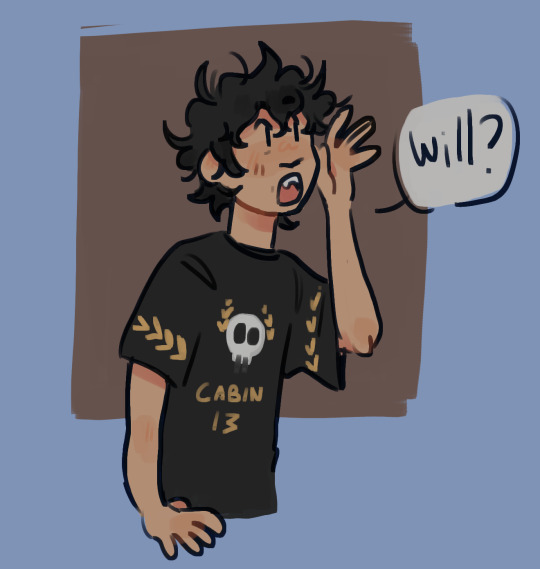

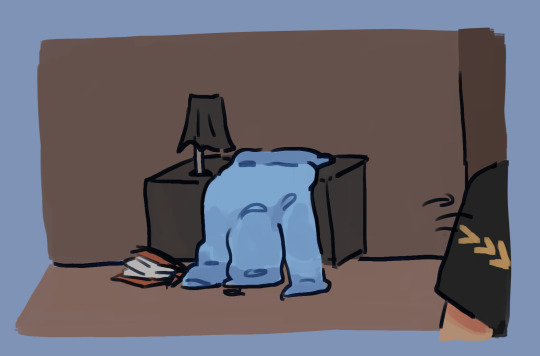
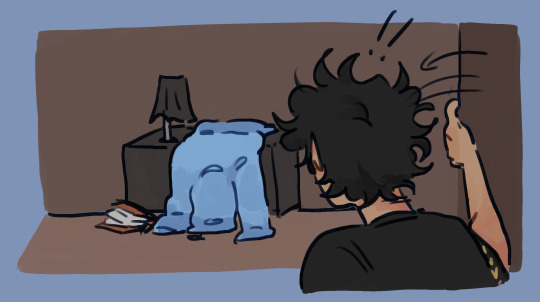

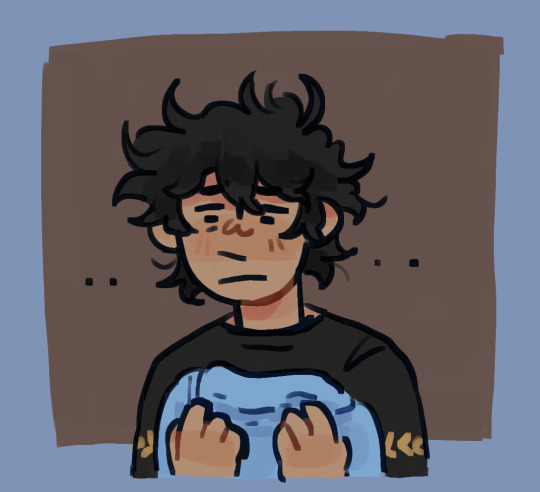
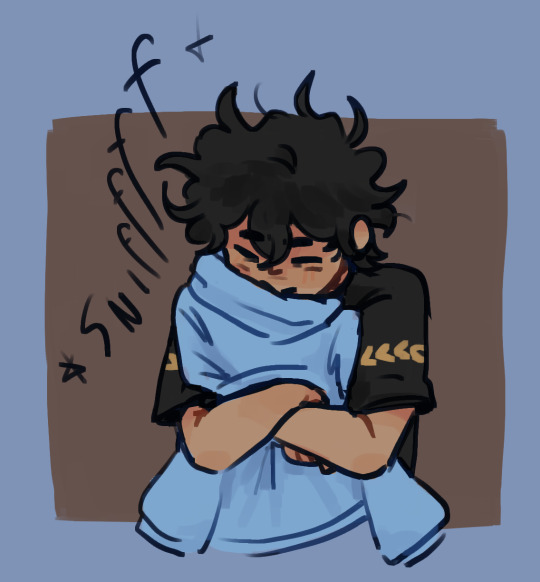
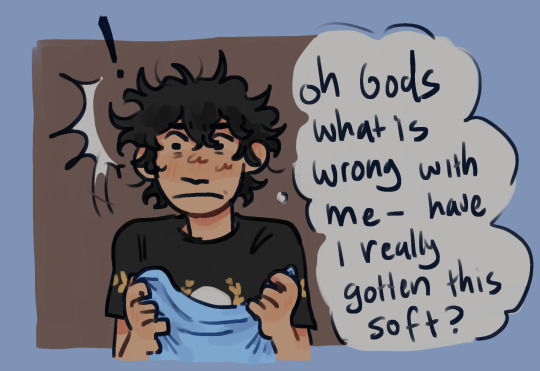

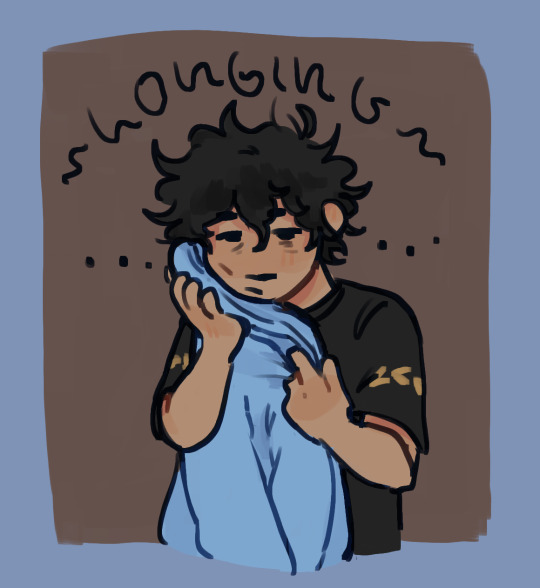
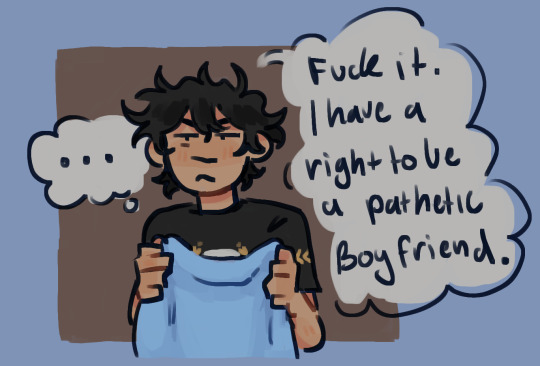


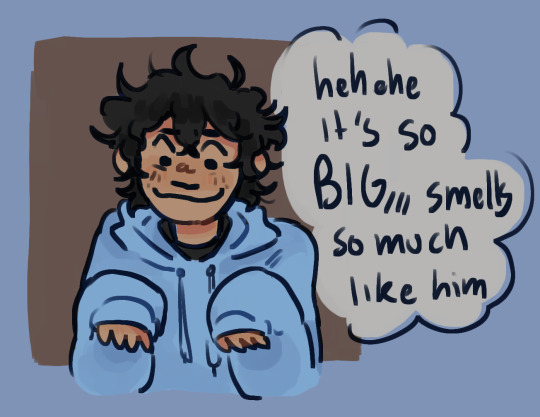
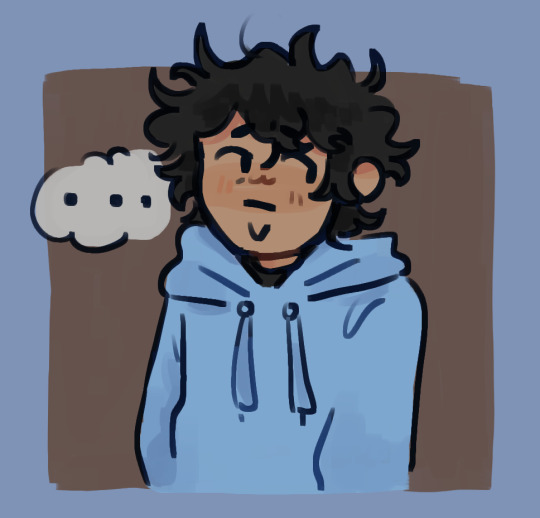
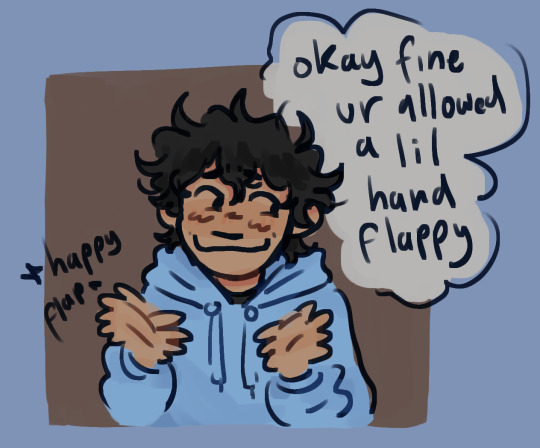
thinking about Nico adjusting to letting himself miss and long for the people he loves. based on these bits from the sun and the star:
" As Nico and Will followed the trogs, he thought about how much he missed Hazel. He was learning to make peace with that feeling. It was okay for him to miss people because that meant he wanted them around in his life. That idea was *very* new for him- he was used to either pushing people away or watching them recoil from his presence." *
" That was the most surreal thing of all... Was he happy? Nico wasn't very familiar with the sensation, but he couldn't deny that he felt wonderful in Will's presence. He even longed for the son of Apollo when they were apart. A funny thing had happened as the two grew closer: Nico suddenly understood all those cheesy, sappy love songs he'd always hated."
#its just. i like that they included that in the book yk. the fact that he prepared a certain distance between everyone#and thus isnt used to missing anyone#so its strange for him#this is probably set somewhere pre tsats just because i like to think it was one of the times he found himself missing and longing.#but it was one of the first times he actually allowed himself to feel that way.#took the feeling and held it instead of banishing it away#also yes letting himself unmask a bit#i like to think he just gets wayyy more expressive with his hands the more he heals#that and he unmasks more!!! more openly stimming!! more special interest rambles!!#just oughh.#anyways this was a huge comic to colour#big fuck you to tumblr who made posting soooo much harder#fuck u and ur updates tumblr#solangelo#pjo#percy jackson and the olympians#percy jackon and the olympians#nico di angelo#will solace#the sun and the star#trials of apollo#they borrow clothes from eachother its real in my head okay#nico canonally bought will a stupid shirt as a joke tho and i love that for them
5K notes
·
View notes
Text
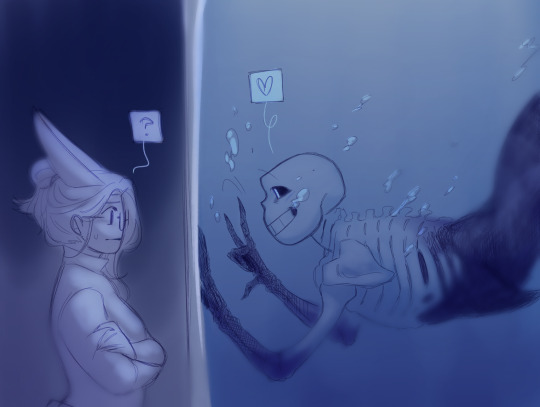
OH my god I gotta continue Tilikum!!
#found this and got blasted with the existence of that fic#i need I NEED MY SIREN DOSIS#I love any siren au sm#AND SKULL IS A CECAELIA#IT JUST GETS BETTEF#HHHHH#Anyway I remember I really liked Sans signaling this to mc#but drawing siren skeletons is tricky jdkejfjf#sans#siren sans#selfindulgent#selfinsert#5am#there's another one of red somewhere but I can't bother to fish it (haha)
793 notes
·
View notes
Text
how i imagine Minecraft Alex's personality to be like vs how i imagine Minecraft Steve's personality. duality of minecraft

#pinyatart#minecraft#minecraft steve#minecraft alex#im pretty rusty with drawing humans rn hhhhdhhhhsss..........#how i see it........#alex represents survival mode. she's more serious rational and focused on getting the resources needed to survive in an endless overworld#while steve represents creative mode. he's laid back chill and doesn't give a fuck and makes whatever stupid shit he feels like making#much to the annoyance of alex. he takes things way sillier than she does. they still kiss tho lmao#she sees an undescribable beauty and horror to the great twisting wilderness around her. he sees somewhere to fuck around and have fun in.#alex is a pro at survival and fighting while steve despite seeming pretty lazy is actually really fucking good at programming redstone tech#which kinda outstands alex cuz she always found it very difficult for her to wrap her head around with all those moving parts to it n such#alex is just pretty good at crafting weapons and survival gear. steve crafts the silly dumb shit for entertainment#anyways end of tag rambling seeya
566 notes
·
View notes
Text



an rc car forum discusses 9-year-old Oscar Piastri
#oscar piastri#.NO YOU DONT UNDERSTAND the amount of sources ive found on both rc cars and karting are like “damn this kid is going somewhere”#.“this kid's talent is crazy” “from the first lap i knew he was special” like... across the board in many ways.#.and from before F1 like it's not just ppl capitalizing on Oscar Piastri McLaren Driver#.also excuse me while I cry abt how both mark webber and random internet person have called him “little legend”#.on a separate silly note the rc forums referring to oscar simply as oscar means that instead of 17 “piastri” threads i have to comb thru#.its now *checks search results prior to 2012* around 300#original
408 notes
·
View notes
Text
one of the foxes seeing neil's drivers license pre-TKM: Who's Alex?
Neil: I think the better question is, "Are you a narc?"
#FOUND IN MY NOTES APP AHHAHA#usually when i write quotes i say where they're from but i'm genuinely not sure if i came up with this or stole it from somewhere#so IF THIS HAS BEEN STOLEN#LET ME KNOW#but if i came up with it myself damn that's hella funny#aftg#all for the game#andrew minyard#the foxhole court#neil josten#aftg headcanon#edit: ITS FROM TROLLS LMAOOOO
644 notes
·
View notes
Text
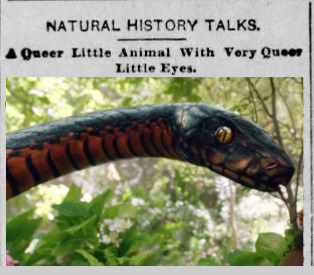
guess who’s been wading thru the archives again
#yes i know it’s as a result of semantic drift etc etc but it’s funny (to me)#this is from the late 19th century I THINK#i found the clipping in my files and forgot the exact publication date#it’s somewhere between 1880 and 1910 definitely (cause that was the era I was examining)#the original paper was discussing chameleons hehe#good omens#crowley#ineffable husbands#good omens 2#aziracrow#aziraphale#go2#ineffable lovers#ineffable wives#good omens season 2#shitpost#good omens shitpost#gomens#gomens 2#David tennant#Michael sheen
3K notes
·
View notes
Text

Oh, just let the gears, my friend
Let 'em turn
#i want to believe that somewhere on the other side Heimerdinger found them#professor who was right from the very beginning and his two silly students#idk im just so soft about this...#arcane#jayvik#jayce x viktor#heimerdinger#jayce talis#viktor arcane#leauge of legends#art#sketch#arcane spoilers#arcane season 2
1K notes
·
View notes
Text
making LEAPS and BOUNDS with the feral kitten!! tonight I managed to slowly move her food onto my lap to encourage her to put her paws on me while she ate, and once that clicked, she kept kneading on my hands and my legs. I've already broken the seal w/ being able to touch her, but getting HER to touch ME seems huge, I think she's been really needing that, since I don't know how long it's been since she's been around her family. wooo progress!!! p.s. I don't have any pictures yet, bc whenever I'm with her, I'm playing a youtube video of cat purrs / trills to calm her down, and if I go to take a picture it'll pause the video. but I WILL take a picture of her soon!
#CONTEXT: she was born in our garage and we've been seeing her and her litter on-and-off ever since#we know she had at least two littermates and I've seen her mom around too#but recently she was all by herself (made her easier to catch) but I haven't seen the rest of the family (I am concerned)#obviously she misses her litter. because she's not used to being alone.#and the only way to make her comfortable is to put on a video of a mama cat trilling at her babies OR a video of a cat loudly purring#it needs to sound like there's another cat around somewhere. again. not used to being alone!#I'd like to see if I can't introduce Toby to her so she can have some feline interaction but he's kind of a cunt. so.#I'll see how I feel about that after she's continued to warm up to these new surroundings she's found herself in.#It's HUGO who truly wants to see her but I doubt a big as fuck dog is what she wants to see right now#but he's desperate to interact with her. he loves kittens.#sergle.txt
405 notes
·
View notes
Text
maria mirameeee maria mirameee si tu me miras el tambien me miraraaaaaaaaaa



dont forget ur daily clicks!!
#I FOUND MORE HOLY MPLY#i must have the creepier traumacore version of the ñast drawing somewhere but i cant find it#sth#sonic#sonic fanart#maria robotnik#nov.aart
878 notes
·
View notes
Text
Y/N, looking at Azul’s baby picture: Oh wow, you were so shaped. So squishy and soft. Full of so much chub to love.
Azul: What are you talking about?? I was a fat, ugly octopus!
Y/N: Fat? Yes. Ugly? No. You were a proper butterball, of whom I would have held and kneaded like dough. Bake you right into an adorable cutiepie.~
Azul: I don’t know what is wrong with your brain and eyes, but I most certainly was not adorable as a kid! Now give me that- *tries to swipe back the picture*
Y/N, dodging him: Nope. You were lovable and round and oh-so baby.~
Azul: I was unlovable! Not like I am now!
Y/N: Oh shut up, that’s just the insecurities and unresolved childhood trauma talking!
Azul: My younger self would ink himself if he saw me now!
Y/N: You peaked in your childhood and will never reach that same level of endearment until you reclaim the chub you so foolishly threw away.
Azul: . . .
Y/N: Your childhood longing is calling, Azul. Answer it.
[Jade and Floyd watching this all go down in the doorway]
Floyd, shoveling popcorn into his mouth: Yeah, Azul, answer it!
Jade: Yes, heed their words, Azul, so that we can partake in your chub too.~
#Twisted Wonderland#TWST#Azul Ashengrotto#Floyd Leech#Jade Leech#Azul Ashengrotto X Reader#GN!Reader#found this old thing and found it stupidly funny#I think I wrote this at like 3AM when I couldn't sleep or something..?#I know I wrote more short joke fics and they're all on my phone somewhere in my notes but I can't find them
2K notes
·
View notes
Note
What would Peri’s power level be if he didn’t have his inhibitor/stabilizer wand and just went apeshit?




While Cosmo deals with too much magic in his body, Peri suffers from a slightly different issue. Cosmo has the greatest amount of magic in Fairy World. Peri is incapable of regulating his magic.
Peri cannot, not then as a child and not now in the present, control his magic. Without his inhibitor, he can easily destroy an entire realm- just as he nearly destroyed Earth as a baby. This fact has not changed, although it is less plausible today than back then.
Peri's taken extra measures in the present-day to ensure it cannot happen.
Bitties Series: [Start] > [Previous] > [Next]
Instability: [Start] > [Previous] > [Next]
#fairly oddparents#fop#fop a new wish#fop wanda#wanda#fop timmy turner#fop timmy#timmy turner#asks#itty bitties fop au#clownjacket#ok last of the first batch!!#also if ur wondering about their anti-counterparts. i have an ask for that !! but like. they've the opposite issues.#AC has near-zero magic and irep has precise control of his magic!#cosmo doesnt deal with his problem anymore because half of his magic is shared with wanda now since they're a bonded pair#and AC borrows his wife's magic since they're ALSO a bonded pair#ALSO ALSO#FAIRY BLOOD!!!!#ITLL BE ITS OWN POST!! in the distant future though bcs i dont have any asks for it and.#and there's a fop post somewhere in my blog. thats specific about fairy blood. i found it so fuckign neat i want to incorporate it in my au#but i need to FIND IT FIRST#the post is a drawing of irep and peri in a fist fight and theyve opposite blood on them (black/white blood)#and its so!!! AOUGHG !!!!!#once i find that post ill make a whole worldbuilding ramblings about fairy blood. but like. what I WILL Say is!!#fairies bleed ichor!!! and all 4 courts have different colors !!! pixies bleed blue. thase all that matters here for now haha#haha man timmy. ur drained of all ur magic and ur bleeding heavily from many vital places and ur first thought is poof? priorities man!!
512 notes
·
View notes
